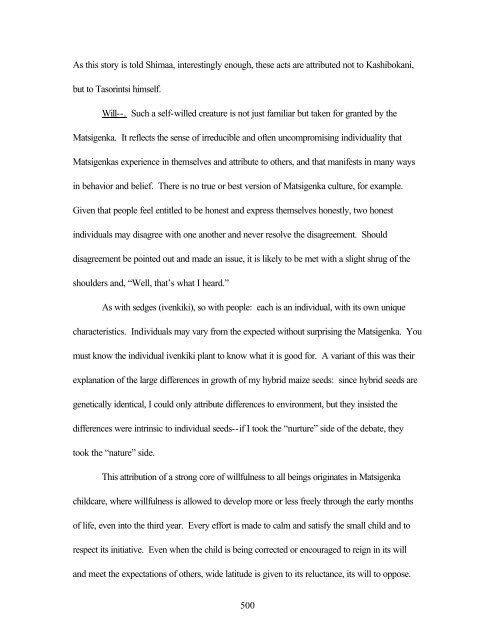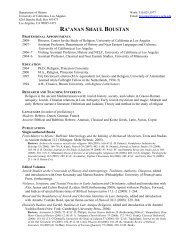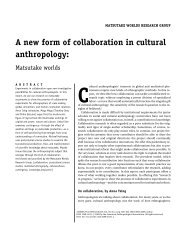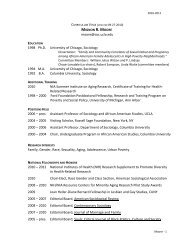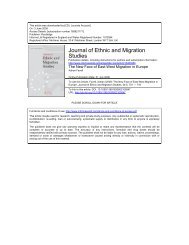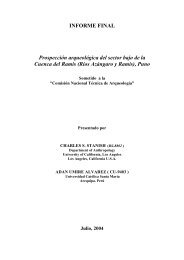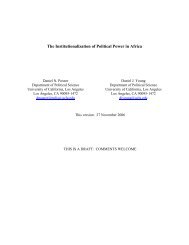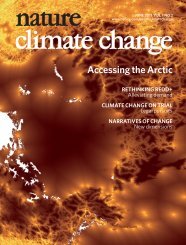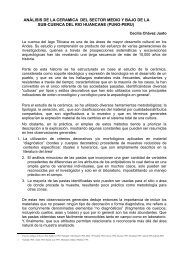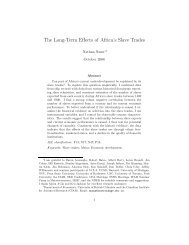433 Chapter Seven Cosmos For the Matsigenka of Shimaa, kameti ...
433 Chapter Seven Cosmos For the Matsigenka of Shimaa, kameti ...
433 Chapter Seven Cosmos For the Matsigenka of Shimaa, kameti ...
Create successful ePaper yourself
Turn your PDF publications into a flip-book with our unique Google optimized e-Paper software.
As this story is told <strong>Shimaa</strong>, interestingly enough, <strong>the</strong>se acts are attributed not to Kashibokani,<br />
but to Tasorintsi himself.<br />
Will--. Such a self-willed creature is not just familiar but taken for granted by <strong>the</strong><br />
<strong>Matsigenka</strong>. It reflects <strong>the</strong> sense <strong>of</strong> irreducible and <strong>of</strong>ten uncompromising individuality that<br />
<strong>Matsigenka</strong>s experience in <strong>the</strong>mselves and attribute to o<strong>the</strong>rs, and that manifests in many ways<br />
in behavior and belief. There is no true or best version <strong>of</strong> <strong>Matsigenka</strong> culture, for example.<br />
Given that people feel entitled to be honest and express <strong>the</strong>mselves honestly, two honest<br />
individuals may disagree with one ano<strong>the</strong>r and never resolve <strong>the</strong> disagreement. Should<br />
disagreement be pointed out and made an issue, it is likely to be met with a slight shrug <strong>of</strong> <strong>the</strong><br />
shoulders and, “Well, that’s what I heard.”<br />
As with sedges (ivenkiki), so with people: each is an individual, with its own unique<br />
characteristics. Individuals may vary from <strong>the</strong> expected without surprising <strong>the</strong> <strong>Matsigenka</strong>. You<br />
must know <strong>the</strong> individual ivenkiki plant to know what it is good for. A variant <strong>of</strong> this was <strong>the</strong>ir<br />
explanation <strong>of</strong> <strong>the</strong> large differences in growth <strong>of</strong> my hybrid maize seeds: since hybrid seeds are<br />
genetically identical, I could only attribute differences to environment, but <strong>the</strong>y insisted <strong>the</strong><br />
differences were intrinsic to individual seeds--if I took <strong>the</strong> “nurture” side <strong>of</strong> <strong>the</strong> debate, <strong>the</strong>y<br />
took <strong>the</strong> “nature” side.<br />
This attribution <strong>of</strong> a strong core <strong>of</strong> willfulness to all beings originates in <strong>Matsigenka</strong><br />
childcare, where willfulness is allowed to develop more or less freely through <strong>the</strong> early months<br />
<strong>of</strong> life, even into <strong>the</strong> third year. Every effort is made to calm and satisfy <strong>the</strong> small child and to<br />
respect its initiative. Even when <strong>the</strong> child is being corrected or encouraged to reign in its will<br />
and meet <strong>the</strong> expectations <strong>of</strong> o<strong>the</strong>rs, wide latitude is given to its reluctance, its will to oppose.<br />
500


